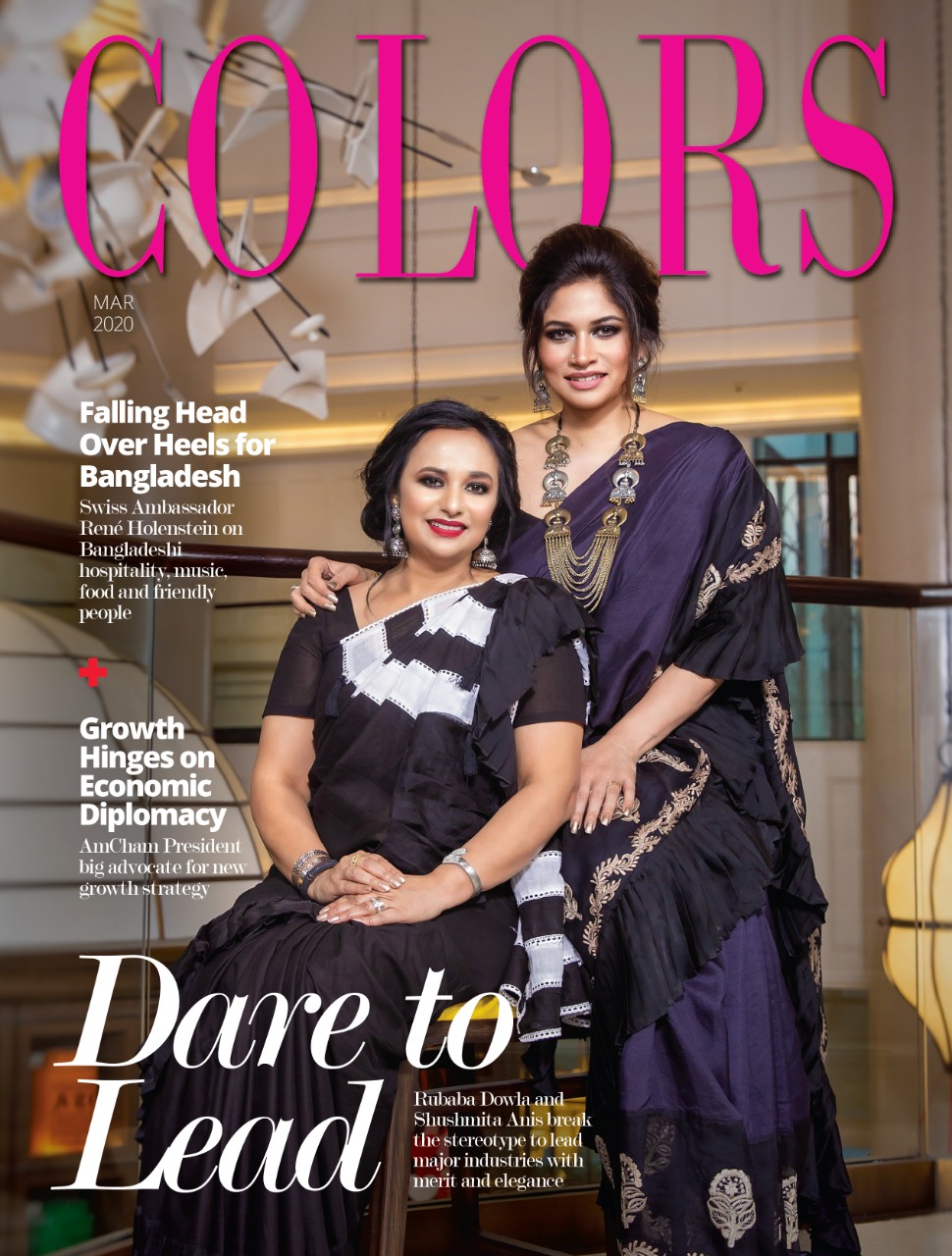The international tech leader at home

On the Cover: Shusmita Anis & Rubaba Dowla.
Wardrobe: Farzana Malik Design
Hair & Makeup: AURA Beauty Lounge
Fashion Direction: Faisal Tushar
Photographer: Kazi Mukul
Location Courtesy: Intercontinental Dhaka
The information and communications technology (ICT) tends to be a rigid sector, due to overwhelming dominance of men. The biggest breakthrough for women came when Sudha Murty became the first female engineer to work in TELCO. The Asian social bubble has had trail blazers like her breaking social stereotypes, and women have been at the forefront of it all.
Rubaba Dowla adds to the list of female leaders who change the norm for both women and society. Especially in an industry that is male-dominated, she stands out from the crowd and is a member of the elite list of women who have been breaking barriers in the tech industry. From Donna Dubinsky who introduced the personal digital assistant to Angelica Ross for making the tech industry inclusive, women have been unsung pioneers. Rubaba Dowla galvanizes and embodies this narrative through running an international tech company in Bangladesh, changing narratives left, right and center. The tech industry is adapting and coming to terms that their segment of previous unsung leaders are now the ones taking the industry to the next level. Being the leading figure for an international technology firm in Bangladesh speaks of volumes on how far hard work and simple persistence can take individuals to.

Photographer: Kazi Mukul.
Tech savvy future
The trajectory of the tech industry in Bangladesh has been exponential. And utilizing ICT for development and sustainability reflects the abilities that Bangladesh possesses to be the next big technological hub. ‘We are one of the world’s fastest-growing economies with a growth rate of around 8 per cent. And with a stable rate of more than 6-7 per cent for the last five years, within the next 5 years we may reach double digit growth. It is expected to be the second fastest-growing economy in the world going forward,’ notes Rubaba Dowla. She has observed that these are reflected more as people learn how to use internet, do freelance work and aim to achieve the Digital Bangladesh Vision.
Strength in merits and inclusion
The STEM fields have been the most difficult waters to charter across. Women especially have diverged away from these sectors even when they have had multiple strives across other sectors. ‘We need more women to participate in these fields, so that innovation remains alive. From the particular position, mentoring and encouraging young minds is a social responsibility and a sincere privilege,’ Rubaba Dowla says.

Women need to be given more opportunities and be curious to seek solutions. The curious minds of today become the future leaders of tomorrow, and that is how the status quo changes organically. As women leaders, they have to be the catalysts that create these social changes, displaying how women have a plethora of opportunities and can thrive in the STEM fields or tech industry. Moreover, having recognisable role models would enable greater participation and show that success is merely a chance and an opportunity away for anyone.
Diversity, equity and inclusivity to eradicate tokenistic approach
Organizations and industries have to realize that symbiotic gestures are not necessarily the most ideal approach. Equal access to opportunities irrespective of genders and rewarding on the basis of performance, competence and capabilities reflect the equitability aspect of appreciation. A diverse work environment leads to improved performances for companies as well. ‘The biggest obstacle that women face is much earlier in the pipeline, at the very first step up to manager- fixing this particular gap in the career path is the key to achieving greater parity.’ Dissolving the problems of underrepresentation and disrupted careers paths is something that Rubaba Dowla identifies as a priority for industries to solve if they aim to improve inclusivity and diversity.

Photographer: Kazi Mukul.
The bigger impact of all these three facets being achieved is how industries and companies become better functioning. Equality becomes the basis to ensure that individuals are given equal chances, pay and accepted for inherent differences. Workplace equality is attained when all workers access same benefits, reward packages, resources, and opportunities to climb the corporate ladder. ‘Inclusive workplaces are six times more likely to be innovative and twice as likely to meet or surpass financial goals. Inclusion can be measured by a sense of belonging, connection and community at work.’ All these reflect on the impact that women can have, not merely because of their difference to approach, more to how they bring a different dimension of thought to the table.





